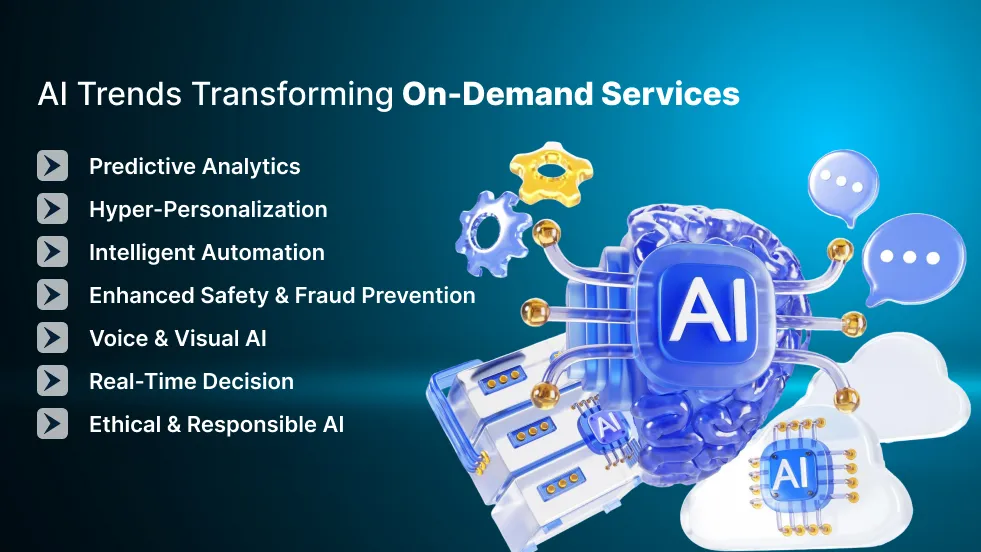The Future of AI in On-Demand Solutions : Trends, Impact & Innovations
Summary–
In this blog, we’ll explore the current trends in AI, its use across different industries, and its impact on on-demand platforms. We’ll also explore why experts believe that the AI future predictions point towards more accessible digital ecosystems. With emerging innovations in the global market, the future of AI lies in the landscape of mobile applications. Logistics, healthcare, and everyday services, that are undergoing rapid changes. Ultimately, this guide provides a deep understanding of the artificial intelligence’s potential and how technology will continue to shape consumer expectations and the future of the on-demand industry.
How AI Is Powering the Next Wave of On-Demand Solutions

Current AI Trends Transforming On-Demand Services

Predictive Analytics
Hyper-Personalization
Intelligent Automation
Enhanced Safety & Fraud Prevention
Voice & Visual AI
Real-Time Decision
Ethical & Responsible AI
Which Industries Will AI Impact the Most?

AI in Mobile App Development
- Provide users with predictive suggestions based on user behaviour.
- Helps you with voice and image recognition for smoother interactions.
- Offers real-time personalisation that feels almost human.
- Power chatbots that can answer questions immediately.
- Improve performance by automatically detecting bugs.
AI in Manufacturing
- Robotic arms assemble products with precision.
- Predictive maintenance prevents expensive breakdowns.
- AI-powered supply chains predict demand.
- The quality control systems detect defects in real time.
AI in Healthcare
- AI in medical imaging detects diseases earlier.
- Virtual health assistants offer 24/7 support.
- Predictive analytics identify health risks
- Robotic surgery improves precision and safety.
AI in Finance
- Fraud detection algorithms instantly analyse suspicious activities.
- Automated investment advisors provide personalised financial advice.
- Risk assessment tools capable of evaluating creditworthiness in seconds.
- AI-driven customer support to simplify banking experiences.
AI in Education
- Adaptive learning systems tailored to each student’s pace.
- AI-led 24/7 tutoring assistants
- Automated grading reduces teacher workloads.
- Interactive learning through VR, AR, and AI simulations
AI in Media and Journalism
- Automatic generation of news for quick updates
- Personalising content by user interest.
- Deepfake detection to fight misinformation.
- Automation of video and audio editing to accelerate production.
AI in Customer Service
- Intelligent chatbots that offer support 24/7.
- Sentiment analysis tools to understand customer emotions.
- Predictive support systems to catch problems before they occur.
- Voice AI agents offering natural, human-like support
AI in Transportation
- Autonomous vehicles will improve safety while reducing human error.
- AI-driven traffic management reduces congestion.
- Intelligent logistics systems that optimise the routes of delivery services.
- Predictive maintenance for vehicles and fleets
Innovations in AI for On-Demand Solutions
Why RG Infotech For AI-Driven On-Demand Platforms
Conclusion
Frequently Asked Questions(FAQs)
The future of AI is transforming and shaping our day-to-day lives, from on-demand apps to smart homes, healthcare systems and automated workplaces. AI will continue to grow in every sector, driven by the advanced trend of personalisation, predictive analytics, automation, and decision-making. As this technology matures, we can expect to see more human-like interaction and a smarter digital ecosystem in the future. AI is the essential tool for the future of technology, business growth and user experience.
Over the next five years, AI is expected to become more advanced, accessible and embedded across various industries. We can see major trends coming in the market, like:
- Autonomous delivery and transportation
- Real-time automation
- Hyper-personalisation in applications
- Voice and visual AI
- Ethical and responsible AI frameworks
As AI has become the centre of future human evolution, it is changing the way we work, shop, communicate and make decisions. Countries like India are leading in the adoption of AI, further strengthening the rapidly growing future of AI in India.
AI is substituting many jobs rather than replacing them completely; most of the repetitive and routine tasks are now performed by AI. Whereas certain job roles may be taken over by automation, new jobs will also emerge in AI oversight, development, data ethics, creative strategy, and human–machine collaboration. The final impact will vary according to how industries adapt and workers evolve their skills. AI is much more likely to redefine the workforce rather than replace it.
Many jobs depend solely on the person’s creativity, emotional intelligence, human judgment, and interpersonal skills, which AI cannot replace. These include:
- Strategic leadership roles
- Therapists, counsellors, and social workers
- Teachers and human-centred educators
- Health professionals who need to be empathetic.
- Skilled trades involving complicated manual work.
These roles required deep human touch, nuanced decision-making and great emotional understanding – these areas are still lacking in AI.
Yes, AI can be used in mobile app development. It helps developers to build a smarter, faster and more personalised application, which in turn provides users with an amazing personalised experience.
- Automated coding assistance
- Predictive analytics
- Personalised user experiences
- Intelligent chatbots
- Smart search features: Voice and visual search
- Fraud detection and security optimisations.
AI does much more than enhance applications; it makes them into intelligent, self-learning digital products that evolve with user behaviour.
Yes, it can be used in web development. It helps streamline processes and improve user experiences. Developers use AI for:
- Automated website builder
- User behaviour analytics
- Smart content recommendations
- SEO optimization
- Integrating chatbots
- UI/UX customisation
- Performance monitoring & security.
From smarter e-commerce sites to dynamic, content-driven platforms, AI is elevating how websites are built and how users interact with them.



 rgisales
rgisales



